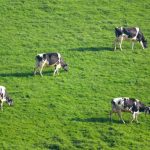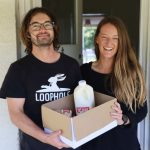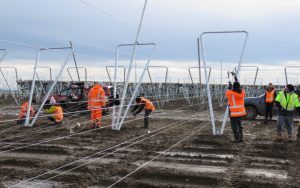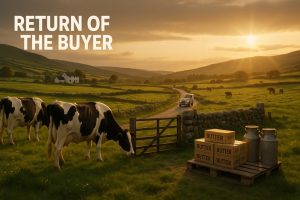
He feels fortunate to still be earning an income, to pay the bills and provide for his family on their dairy farm in the Waikato.
“My heart goes out to those who can’t work,” Moore said. “We can still work, still pay the mortgage but I know there are many people out there who can’t.”
Stuff is celebrating the coronavirus champions – including essential services workers like Moore and community volunteers – who are keeping New Zealand going though the lockdown.
The Moores lease 100 hectares and own another 45ha in Okoroire, near Matamata. The farm milks 450 cows and has a three-year average milk production of 180,000kg of milk solids.
Their bubble includes Moore’s wife Lizzie, who works at Dairy NZ and is a consulting officer for Hamilton and Cambridge, and their two children, as well as Moore’s farm assistant, Aimee Spilsbury and her family.
“We have just created a bubble on the farm. Amy doesn’t go anywhere because her four kids are at home as well. No one comes to see them and no one comes to see us. That’s our bubble.
“The lockdown hasn’t changed a lot at home but we are mindful of the [coronavirus] cluster detected in Matamata, which is so close to us.”
But for some farms, its harder to form bubbles, he says – contract and share milkers who don’t live on-farm have to get special written permission to travel to work each day.
As the Waikato Federated Farmers dairy chairman and an executive member of the National Federated Farmers Dairy Executive, Moore would usually be off-farm attending two or three meetings in Hamilton or Auckland each week.
“Now, I’m meeting with people by just speaking on the phone, so I’m not having to drive around which is quite nice. There’s a bit more work getting done on the farm and that’s a positive.”
Moore thinks productivity could be lifting on farms like his as a result, and some lockdown changes might become the norm.
“You can jump in a car or ute and travel an hour to meet someone, but is there really any need to drive around the Waikato aimlessly? I think that’s a question everyone is starting to ask now.”
Moore says being an essential service gives a new sense of purpose to their working day.
“At 3.50am, the alarm goes off and I have a coffee, toast and a quick catch-up on emails, the news, Snapchat, WhatsApp, Twitter and Facebook. Then I’m out the door by 4.20am to get the cows into the feedpad to start milking by 4.45am.”
First milking of the day is completed around 7am.
Feed and paddocks are prepared for the afternoon and evening, there’s time for a break at 8.30am, and then it’s all about farm maintenance work through to noon.
“Today, we’re working on getting firewood ready for winter, so I’m on the chainsaw for most of that time. Then we’ll go into getting maize into the feedpad and that will take us through to 1pm.
“Amy gets lunch for about two hours and I’ll go and have lunch for an hour and maybe a snooze if I can.”
The team meets again just before 2.30pm when the second milking of the day starts. “We’re normally done by 4.45pm and home by 5pm.”
A tanker driver is the only outsider who visits the farm now, but there’s no contact.
“I get a notification on my phone about what’s been collected not long after they’ve left the farm gate,” Moore says. “I know Fonterra has strict guidelines and protocols around keeping the tankers clean and the drivers safe.”
Moore said his work with Federated Farmers continues through the coronavirus crisis and his advice is now is great demand.
“Initially, when we went to level three, with the imposing threat of level four, there was a lot of questions around whether dairy farmers could still operate.
“It was a stage of shock and grief I suppose as people came to terms with the threat and what it meant. There were a lot of rumours and it was a case of keeping people calm.”
He says clear messages are needed to stop high-level panic.
“Dairy NZ has a great website which works as a guide for farmers, the level of information there is huge.
“But people seem to go straight to the farming [social media] pages to ask questions, and get about 40 different answers back.
“Not all are going to be correct and it just adds to the confusion.”
Federated Farmers also has a helpline for farmers looking for answers as they prepare for the new milking season and the year ahead.
“Feed prices have gone up tremendously and we have to be mindful of that three months away from calving. So it’s time now to think about drying off cows, especially with grass growth slow, because of the drought.”
Moore said long term, in the back of his mind, he’s worried about where commodity prices might land the dairy industry.
“At the moment we are deemed to be the (important) commodity in New Zealand but what might that look like next year for us?”
He’s also worried about his wider community. Local businesses like Hobbiton, a major international tourist destination near Matamata, had taken a “massive knock”.
“I wonder how much longer this is going to go on for, how many more years we’re not going to be allowed to let people back in (to New Zealand).
“Hobbiton has done an awful lot for the town and they are going to really struggle, unfortunately.
“I think people still have a lot of questions. The government has reacted well and I think the country is playing its part to keep everyone safe.”

























